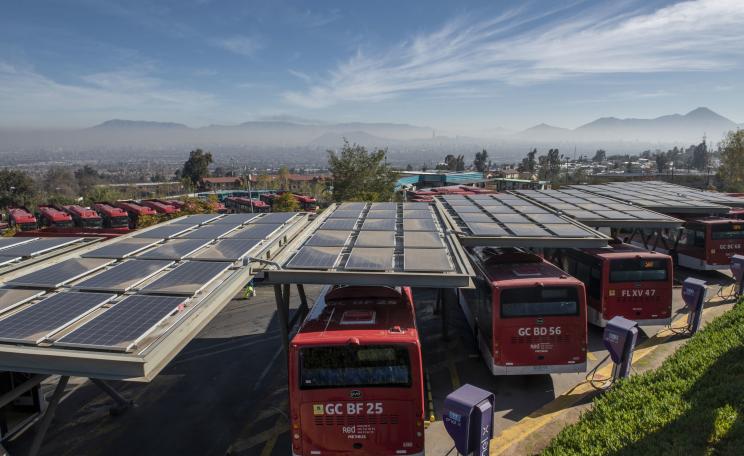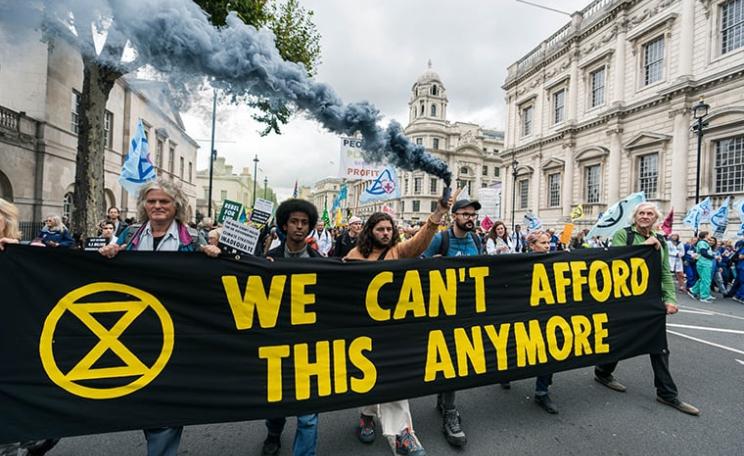We face the very real danger of an emboldened and resurgent oil industry, positioned ever more centrally within our political and economic systems.
The coronavirus pandemic has given human society a jolt, sent the world economy into depression, and is producing what looks like the sharpest-ever cut in the level of greenhouse gas emissions.
Is this going to help or hinder us in tackling climate change in the coming years and decades? Will it speed up or slow down the transition away from fossil fuels?
It could go either way, in my view. It depends on what governments do – but also on what society does, what we all do.
History
What we do is a question with many moving parts with a couple of consistent themes. On one hand, capitalism thrives by emerging from the crises it has created; its powerful drivers endlessly seek new ways of producing, profiteering and exploiting. We will be up against that logic, whatever happens.
On the other hand, those crises – and the pandemic, with the resulting economic chaos, certainly counts as one of the greatest – produce glimpses of how we could live differently. They contain the possibilities of futures free of capitalism, in which we can take effective strides away from the wretched fossil-fuelled economy.
The historical analogies are not comforting. Past economic crashes gave way to accelerated economic expansion and accelerated greenhouse gas emissions.
The 1930s depression and the second world war, the greatest dislocation of the world economy in the twentieth century, was followed by the post-war boom. That was the longest consistent period of expansion of the world capitalist economy ever; a period of unprecedentedly steep increases in fossil fuel use; and the start of what earth systems scientists call the “great acceleration” of impacts of human economic activity on the natural world.
The 2008-09 financial and economic crisis was the prelude to a rapid acceleration of greenhouse gas emissions – despite the fact that the world’s governments had already been promising for two decades to prioritise decarbonisation.
Crash
The crash this year is much more serious than in the one in 2008-09.Carbon Brief estimates that, due to the impact of the coronavirus on economic activity, greenhouse gas emissions in 2020 could be 2 billion tonnes – more than 5 percent – lower than in 2019. But their report warns:
We face the very real danger of an emboldened and resurgent oil industry, positioned ever more centrally within our political and economic systems.
Even this would not come close to bringing the 1.5C global temperature limit within reach. Global emissions would need to fall by some 7.6 percent every year this decade – nearly 2,800MtCO2 in 2020 – in order to limit warming to less than 1.5C above pre-industrial temperatures.
China is coming out of its coronavirus lockdown – or maybe, the first of its coronavirus lockdowns – and emissions are getting back to their previous levels quite quickly. Their carbon emissions were down by a quarter during February, but over the next seven weeks (March and early April, roughly) “returned to normal levels”, according to expert analysis by Lauri Myllyvirta of the Centre for Research on Energy and Clean Air. Myllyvirta warns:
As before, however, the Chinese government’s coming stimulus in response to the disruption could outweigh these shorter-term impacts on energy and emissions, as it did after the global financial crisis and the 2015 domestic economic downturn.
While Chinese banks have cut their forecasts of how fast GDP will grow, the Communist Party Central Committee meeting in March emphasised the goal of doubling GDP in the decade to 2020 – which implies almost 6% GDP growth this year.
The government could try to hit that target by accelerating investment in fossil-fuel-heavy industries such as steel-making and construction, Myllyvirta writes – which would clearly undermine decarbonisation. Most alarming is the fact that in the first half of March, authorities in China gave permits to build more coal-fired power station capacity (7.96 gigawatts) than they did in the whole of 2019 (6.31 gigawatts).
In Australia, which supplies China and other Asian economies with coal, the mining industry has been exempted from lockdown regulations.
Oil
Demand for oil has crashed, sending some prices negative for the first time ever. Right now, global oil demand is between a quarter and a third lower than the average for last year, about 100 million barrels per day (b/d).
The International Energy Agency estimates that demand in April will be 29 million b/d lower than last year; the US Energy Information Agency reckons, 18 million b/d lower. Both think it will bounce back, and for 2020 as a whole end up at around one-tenth lower than last year.
Trafigura, one of the world’s biggest oil trading firms, reckons the demand collapse is even more drastic, and that demand is now 35 million b/d lower than last year.
In mid March, oil prices collapsed, and last week they went negative. Brent crude (the main marker price for crude oil on this side of the Atlantic), went below $20/barrel for the first time since 2002.
Still more dramatically, on Monday last week – with storage tanks filling up and room to store newly-produced crude in the USA running out – the West Texas Intermediate price, a key marker in the USA, sank to minus $40/barrel before recovering to plus $11.57/barrel.
Yes, the producers had to pay traders to take the oil off their hands, as they had nowhere to store it! The effect was exacerbated by some firms hoovering up storage capacity to create an artificial shortage. The wonderful workings of markets.
Recovery
Super-cheap oil will, supposedly, help the transport sector to recover from the economic slump we are now living through. As demand comes back, prices will rise.
Nevertheless, some of the bankers and traders who make their money by betting on future market trends think oil demand will never go back above the 100.9 million b/d purchased in 2019.
Mark Lewis, an analyst at BNP Paribas Asset Management, argued that long term demand will be depressed (i) by efficiency improvements in the transport sector (i.e. vehicles going further on the same amount of fuel); (ii) the move to electric vehicles; (iii) and “behavioural changes” caused by the coronavirus pandemic, including a permanent reduction in commutes and other car journeys, and air travel.
Good points. On the other hand, (i) governments are aiming to use gigantic quantities of money to stimulate a renewed bout of – inevitably largely fossil-fueled – capitalist expansion as the effect of the pandemic fades, and (ii) while some of these permanent shifts in demand may happen in rich countries, there is a real prospect that in the global south, renewed fossil-fuel-intensive development will dominate.
Resurgence
But some outlines of the oil industry’s future are in sight. The rich producing nations will elbow aside the poorer producing nations; the big companies will eat the small companies.
Russia, Saudi Arabia and the Gulf states will weather the storm of low prices. They have tens of billions of dollars in sovereign wealth funds, accumulated in times of higher prices, to underpin their state finances. Poorer producing countries who are heavily reliant on oil revenue – Nigeria, Angola, Ecuador – will suffer. Pemex, the Mexican state-owned oil producing company, is teetering on the edge of bankruptcy.
Low prices will divide companies, too. The US shale oil producers, who have high costs of production and have typically borrowed heavily to finance future output, are in big trouble. Whiting Petroleum, the largest independent producer in North Dakota, this month filed for bankruptcy.
But this is not the end of oil companies. Indeed, the writer Adam Hanieh has argued convincingly that the bankruptcies of smaller companies will actually “accelerate the further centralisation of control by the largest oil majors” – and that
We face the very real danger of an emboldened and resurgent oil industry, positioned ever more centrally within our political and economic systems. Such an eventuality would be a disastrous outcome to this current pandemic.
Renewables
ExxonMobil and other big producers in the USA can hardly wait to swallow their smaller rivals. In March, the American Petroleum Institute (API), a powerful lobby group representing the big fish, wrote to Donald Trump urging him to loosen environmental regulations – but were less keen on measures to keep the oil price up, and so save the small fracking companies from bankruptcy.
The fracking companies’ pleas to the White House, to adjust prices to help them survive, fell on deaf ears, DeSmog Blog reported.
Scott Sheffield, CEO of Pioneer Natural Resources, said: “We’ve had opposition from Exxon, who controls API and the Texas Oil and Gas Association. They prefer all the independents to go bankrupt, and pick up the scraps.”
But as long as the rules are rigged in favour of heavily-subsidised fossil fuels, a flow of up-front investment is needed if renewables are to increase their share of the electricity market. There’s little reason for optimism about that.
The looming economic depression has cast doubt over renewables projects everywhere. “Construction is slowing, tenders are postponed, and for earlier-stage projects, there are question marks around financing”, warned Greentech Media. The number of new solar installations could fall year-on-year for the first time since the 1980s, a report by Bloomberg New Energy Finance suggested.
In China, solar manufacturers are planning new factories that could produce 240 gigawatts of solar panels per year. But elsewhere, investors are pulling back from renewables – especially in the USA, where a crucial subsidy for new plants runs out at the end of this year.
Cars
In addition, the coronavirus epidemic has slashed car use in some countries. The motor manufacturing industry is in trouble too. But this may not make an enduring difference to greenhouse gas emissions.
Car sales were “collapsing” even before the coronavirus-driven recession, The Economist said in an editorial this week – and now they are expected to be down by one-fifth this year globally. Furthermore, “as recession bites, people may default on car loans, many of which are owed to carmakers’ finance arms.” What’s more:
There may be a permanent fall in commuting, as more people work from home – road-passenger numbers in China are still 57 percent below their pre-Covid level.
A prolonged recession could “damage sales for good”, The Economist warned – although health concerns related to coronavirus could also make it harder to persuade people to switch to public transport.
The magazine, a bible of business, urged car companies to invest in electric cars. In my view, that will merely preserve car-based urban transport systems, and the car culture that goes with them, without producing a substantial drop in greenhouse gas emissions. Our response needs to focus on making cities based on other forms of transport.
Aviation
On top of that, aviation is in big trouble, and it won’t recover in a hurry.
Flight numbers this month are 70 percent lower than they were in April last year, to the International Air Transport Association has said. Airlines are among the companies most at risk from the coronavirus health crisis and the economic slump it has caused.
The analysts who follow aviation’s fortunes for big capital say it will take three years to get back to its 2019 level. It may never do so, since, until a coronavirus vaccine is found, much of the demand for (often unnecessary) flights for business or leisure may not return.
The Marxist geographer David Harvey has argued convincingly that flying and just-in-time supply chains that often rely on flying are vital for new modes of consumerism that “exploded after 2007-08” and have now “crashed with devastating consequences”.
These modes of consumption – including international tourism, which expanded in volume from 800 million trips in 2010 to 1.4 billion in 2018 – required “massive infrastructural investments” in airports and airlines, hotels and restaurants, theme parks and cultural events, Harvey wrote.
This site of capital accumulation is now dead in the water: airlines are close to bankruptcy, hotels are empty, and mass unemployment in the hospitality industries is imminent.
But none of this means that aviation, and the associated greenhouse gas emissions, are gone for ever. Capitalist governments are putting in place gigantic rescue packages for airlines: $58 billion in the USA, and substantial packages in Norway, Italy, Australia and New Zealand. The German, French and British governments are all talking to airline owners.
Policy
Government policies will make a huge difference – as the example of airlines shows. In the largest greenhouse-gas-emitting countries, these are focused on reviving the most powerful companies and retaining the fossil-fuel-based economic model.
The worst news is, of course, from the USA. One of the government’s first actions when the coronavirus pandemic hit was to suspend most of the Environmental Protection Agency’s activities, to allow businesses to pollute above and beyond legal limits with no risk of prosecution.
Environmental requirements have been stripped out of the $2.2 trillion stimulus package approved by Congress. Lobbyists for the aviation industry made sure that a commitment for it to halve its emissions by 2050 was removed.
China’s policy decisions on the 14th Five Year Plan (2021-25) will also be crucial. The electricity authorities are lobbying hard for a huge expansion of the coal-fired power station fleet, which would wreck efforts to reduce greenhouse gas emissions.
Analysts at Carbon Brief fear that, post-coronavirus, “controls on [power station] overcapacity may be vulnerable to the political priority of propping up economic growth”.
Green Deal
Worryingly, even the European Green Deal, which looked like the most serious political commitment to a transition away from fossil fuels, is in danger.
The new EU Climate Law, which would commit Europe to net zero carbon by 2050, “has been bogged down in a parliament that is now meeting virtually, and seems likely to be delayed”, the Financial Times reported.
Even adjusting the target for 2030, from 40 percent reduction to 50 or 55 percent, “looks at risk”: “What would normally be a simple bureaucratic calculation has turned into a quagmire”.
The Politico website reported that while Brussels is still saying that the post-coronavirus economic stimulus will be consistent with the Green Deal, big industry has seen its chance: “The recovery effort has set off a mad rush of lobbying as industries like autos and aviation scream for bailout cash."
The European Automobile Manufacturers Association called for planned CO2 emissions targets to be delayed, whiel the Czech prime minister, Andrej Babis, said what others were thinking and called for the Green Deal to be scrapped all together.
COP26
The next session of the international climate talks, COP26, has been postponed from November this year to a date (probably in 2021) yet to be fixed. And there are plenty of signs that governments will use the coronavirus epidemic as an excuse to renege on commitments made to tackle greenhouse gas emissions.
Although the postponement robs campaigners of a focus, some climate scientists nevertheless tried to put a brave face on it.
The whole talks process of the last 30 years is less important for the campaigning opportunities it provides than for what it tells us about the deep crisis of the big capitalist states, in my view. The entire history points to their inherent inability to find the will or the means to tackle climate change.
There is little doubt that, whenever it is held, COP26 will appeal to governments and corporations to use technologies to redirect the economy down a “greener” path to the same ends. This will not tackle climate change.
What is needed is to transform the economy, to change its purpose, so that it is producing to meet human needs and to develop human society – not for profit. And that, in turn, means challenging the centres of power and wealth in a way that COP 26 will obviously not begin to do.
Action
After thirty years of inaction by governments, the revival of climate protests by striking school students and others showed the potential for popular action. The coronavirus epidemic has stopped street protests, but has triggered new forms of social action. These are sources of hope.
In this most serious social crisis, people are discovering, and rediscovering, their ability to take matters into their own hands. Everywhere, they have formed mutual aid groups to help each other, and to support health workers. In workplaces, they are acting collectively to demand protection from the virus, to demand protection from the economic effects.
In some cases, people are fighting for production to be repurposed – from aircraft parts to ventilators, from McDonalds to free meals, and so on – to help deal with the coronavirus. Small firms (whisky to hand-cleaner), self-managed enterprises(alcohol gel, masks and furniture), school students and – well, just people – have found ways to put their skills to good use.
This sort of imagination and creativity will be vital, too, in dealing with climate change.
These actions prefigure a future blocked off from us by capitalism but well within the reach of our imagination.
Future
So there is no simple, yes-or-no answer to the question of whether the coronavirus crisis helps or hinders efforts to tackle climate change.
The fact of an economic crash does not itself produce guarantees, since big capital is, right now, working out how to profit from the recovery.
Governments will default to enabling that process, unless forced by society to do otherwise. Society, in opposition to big capital, needs to find ways both to tackle climate change and to pursue social justice.
We are seeing, in the context of the coronavirus epidemic, glimpses of the roads towards a future beyond capitalism in which we could do both.
This Author
Simon Pirani is an energy researcher and historian. His most recent book is Burning Up: A Global History of Fossil Fuel Consumption (Pluto 2018). He blogs at People and Nature and tweets as @SimonPirani1. This article originally appeared under the pseudonym Gabriel Levy.
Image: American health workers’ picket line. Photo: Elizabeth Lalasz / Labor Notes.






